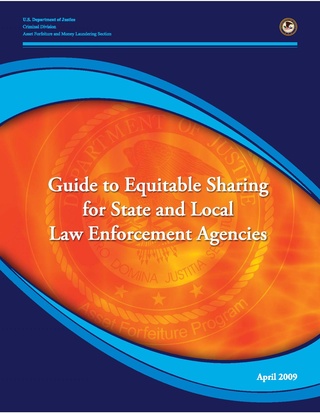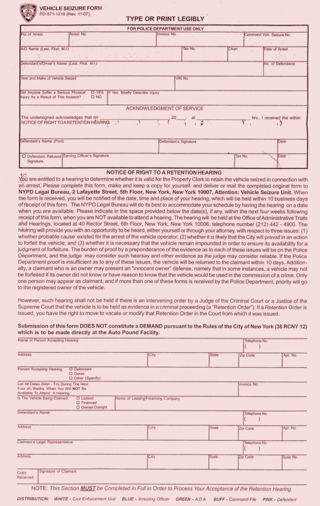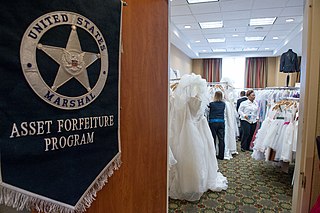
The Eighth Amendment to the United States Constitution protects against imposing excessive bail, excessive fines, or cruel and unusual punishments. This amendment was adopted on December 15, 1791, along with the rest of the United States Bill of Rights. The amendment serves as a limitation upon the state or federal government to impose unduly harsh penalties on criminal defendants before and after a conviction. This limitation applies equally to the price for obtaining pretrial release and the punishment for crime after conviction. The phrases in this amendment originated in the English Bill of Rights of 1689.

The Institute for Justice (IJ) is a libertarian non-profit public interest law firm in the United States. It has litigated ten cases before the United States Supreme Court dealing with eminent domain, interstate commerce, public financing for elections, school vouchers, tax credits for private school tuition, civil asset forfeiture, and residency requirements for liquor license. The organization was founded on September 3, 1991. As of 2023, it employed a staff of 157 full-time staff members in Arlington, Virginia and seven offices across the United States.
Confiscation is a legal form of seizure by a government or other public authority. The word is also used, popularly, of spoliation under legal forms, or of any seizure of property as punishment or in enforcement of the law.
In rem jurisdiction is a legal term describing the power a court may exercise over property or a "status" against a person over whom the court does not have in personam jurisdiction. Jurisdiction in rem assumes the property or status is the primary object of the action, rather than personal liabilities not necessarily associated with the property.

Asset forfeiture or asset seizure is a form of confiscation of assets by the authorities. In the United States, it is a type of criminal-justice financial obligation. It typically applies to the alleged proceeds or instruments of crime. This applies, but is not limited, to terrorist activities, drug-related crimes, and other criminal and even civil offenses. Some jurisdictions specifically use the term "confiscation" instead of forfeiture. The alleged purpose of asset forfeiture is to disrupt criminal activity by confiscating assets that potentially could have been beneficial to the individual or organization.
United States v. Bajakajian, 524 U.S. 321 (1998), is a U.S. Supreme Court case holding that asset forfeiture is unconstitutional when it is "grossly disproportional to the gravity of the defendant’s offense", citing the Excessive Fines clause of the Eighth Amendment. It was the first time the Court struck down the federal government's "aggressive use of forfeiture" and the only time it has held that an imposed fine was unconstitutional under the Eighth Amendment.

United States of America v. $124,700 in U.S. Currency, 458 F.3d 822, was a decision of the United States Court of Appeals for the Eighth Circuit that was handed down on August 18, 2006.
Scott G. Bullock is an American lawyer who focuses on property rights issues such as eminent domain and civil forfeiture. He has been president and General Counsel at the Institute for Justice since 2016, a nonprofit libertarian public interest law firm. He represented Susette Kelo in Kelo v. City of New London, an eminent domain case decided by the Supreme Court in 2005. Bullock was a senior attorney before becoming the president of the institute and directed many cases on state and federal level. In 1994 he represented the institute in a forum on C-SPAN.

The Fifth Amendment to the United States Constitution creates several constitutional rights, limiting governmental powers focusing on criminal procedures. It was ratified, along with nine other articles, in 1791 as part of the Bill of Rights.
United States v. Schooner Peggy, 5 U.S. 103 (1801), was a United States Supreme Court case. It was one of a series of cases resolving disputes over ships captured during the undeclared Quasi-War between the United States and France from 1798 to 1800. The vessel was ordered returned to France.
Bennis v. Michigan, 516 U.S. 442 (1996), was a decision by the United States Supreme Court, which held that the innocent owner defense is not constitutionally mandated by Fourteenth Amendment Due Process in cases of civil forfeiture.

Equitable sharing refers to a United States program in which the proceeds of liquidated seized assets from asset forfeiture are shared between state and federal law enforcement authorities. The Comprehensive Crime Control Act of 1984 set up the arrangement in which state and local police can share the seizures with federal agents. The law allows state and local law enforcement to retain up to 80% of the proceeds from seizures made in collaboration with federal agencies and from seized assets turned over to the federal government that the federal government then elects to adopt.

A Krimstock hearing is an administrative law proceeding that offers vehicle owners the opportunity to recover possession of a vehicle confiscated by the New York City Police Department (NYPD) during an arrest. Police have authority to impound vehicles used as an instrument of a crime, and later to seek permanent ownership of these vehicles in civil forfeiture actions. Such forfeiture actions, like the Krimstock administrative hearings, are entirely separate from any criminal charges the vehicle owner may face stemming from his or her arrest.
Alvarez v. Smith, 558 U.S. 87 (2009), was a United States Supreme Court decision on seizure of property by the Chicago Police Department, however the case was declared moot by the Court as the parties agreed that there was no longer contention over the property seized.

In the United States, civil forfeiture is a process in which law enforcement officers take assets from people who are suspected of involvement with crime or illegal activity without necessarily charging the owners with wrongdoing. While civil procedure, as opposed to criminal procedure, generally involves a dispute between two private citizens, civil forfeiture involves a dispute between law enforcement and property such as a pile of cash or a house or a boat, such that the thing is suspected of being involved in a crime. To get back the seized property, owners must prove it was not involved in criminal activity. Sometimes it can mean a threat to seize property as well as the act of seizure itself. Civil forfeiture is not considered to be an example of a criminal justice financial obligation.
Austin v. United States, 509 U.S. 602 (1993), was a case in which the Supreme Court of the United States held that the Eighth Amendment to the United States Constitution applies to civil forfeiture cases.
Timbs v. Indiana, 586 U.S. ___ (2019), was a United States Supreme Court case in which the Court considered whether the excessive fines clause of the Constitution's Eighth Amendment applies to state and local governments. The case covered the asset forfeiture of the petitioner's truck after the police found a small quantity of drugs within it and he was convicted on non-felony possession charges.
United States v. 422 Casks of Wine, 26 U.S. 547 (1828), is an 1828 United States Supreme Court civil forfeiture case between the United States and 422 casks of Malaga wine. The case was brought after the United States moved to seize the wine on the grounds that it had been deliberately mislabeled as sherry to get a tax drawback, and the buyers objected. The original trial was ruled in favor of the United States but was ordered to be retried after errors were discovered concerning jurisdiction. In the subsequent retrial, the Supreme Court ruled against the United States; however, they did grant them a certificate of seizure on probable cause.
South Dakota v. Fifteen Impounded Cats, 785 N.W.2d 272, is a 2010 Supreme Court of South Dakota civil forfeiture case brought by the American state of South Dakota against fifteen cats that they had seized on the grounds of interfering with a driver's visibility. The seizure was challenged by the owner of the cats and the court found on a 3–2 majority that the seizure was lawful because of the risk to pedestrians as well as to the cats.
Culley v. Marshall is a case pending before the Supreme Court of the United States regarding the timing of post-seizure probable cause hearings under the Due Process Clause of the 14th Amendment. The Court has been asked to determine whether the "speedy trial" test from Barker v. Wingo or the balancing test from Mathews v. Eldridge applies to a judicial-forfeiture proceeding.








